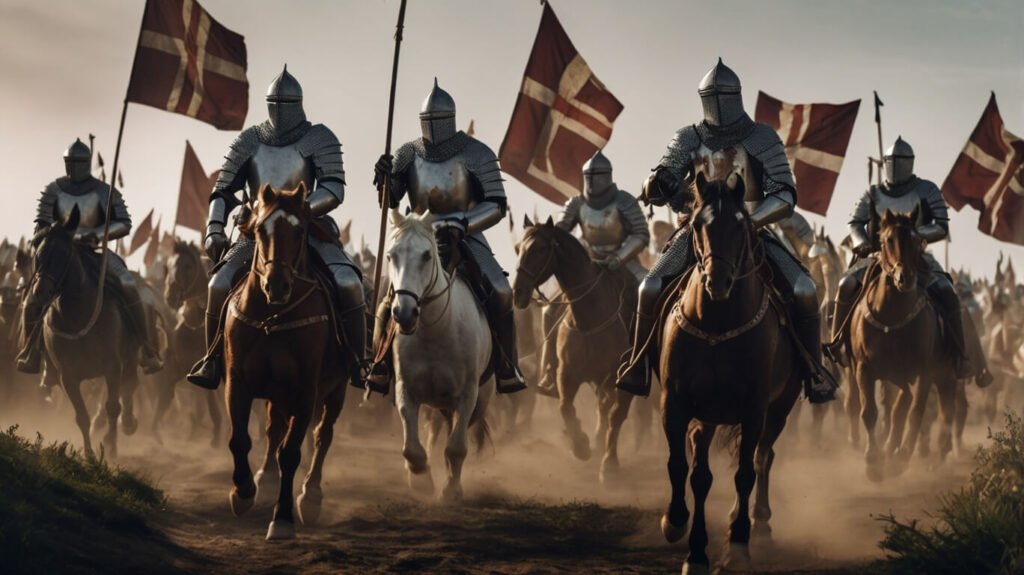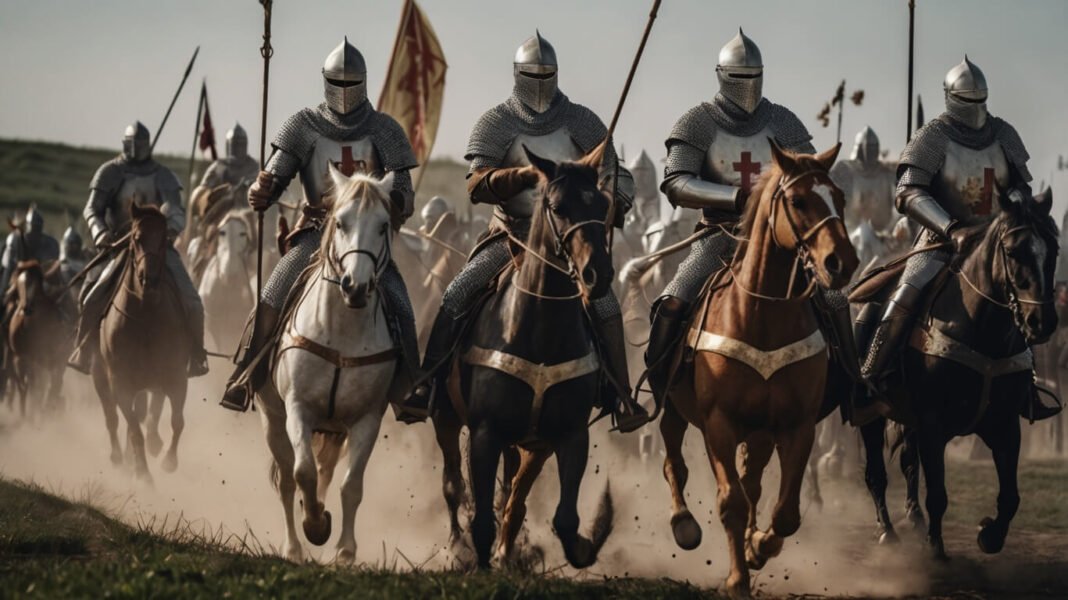What Were the Crusades?
The Crusades were a series of religious wars that took place during the medieval period. They were mainly between European Christians and Muslims in the Middle East. These wars spanned from the late 11th century to the late 13th century. They had a profound impact on the history of Europe and the Middle East.

Why Did the Crusades Start?
The Crusades began with a call for help. In 1095, the Byzantine Emperor Alexios I Komnenos needed assistance to defend his empire from Turkish invaders. He reached out to Pope Urban II. The Pope saw this as an opportunity to unite European Christians and reclaim the Holy Land, especially Jerusalem, from Muslim rule.
At the time, Jerusalem held significant religious importance for Christians, Muslims, and Jews. For Christians, it was the site where Jesus Christ was crucified and resurrected. Muslims revered it as the location of the Al-Aqsa Mosque, and Jews considered it their ancient homeland.
The First Crusade (1096-1099)
The First Crusade was a success for the Europeans. Thousands of knights and peasants from different parts of Europe heeded the Pope’s call. They embarked on a long and arduous journey to the Middle East.
After several battles and a long siege, the Crusaders captured Jerusalem in 1099. This victory was marked by a brutal massacre of the city’s Muslim and Jewish inhabitants. The Crusaders established several Crusader states in the region, including the Kingdom of Jerusalem.
The Second Crusade (1147-1149)
The Second Crusade was launched in response to the fall of the County of Edessa, one of the Crusader states, to Muslim forces. King Louis VII of France and Emperor Conrad III of Germany led the campaign. However, it ended in failure. The Crusaders were unable to recapture Edessa and suffered heavy losses.
The Third Crusade (1189-1192)
The Third Crusade is perhaps the most famous. It was led by three of Europe’s most powerful monarchs: Richard the Lionheart of England, Philip II of France, and Frederick I Barbarossa of the Holy Roman Empire. The goal was to retake Jerusalem after it had fallen to the Muslim leader Saladin in 1187.
Despite several military victories, the Crusaders could not recapture Jerusalem. However, Richard the Lionheart negotiated a treaty with Saladin. This agreement allowed Christians to visit the holy sites in Jerusalem without fear of persecution.
The Fourth Crusade (1202-1204)
The Fourth Crusade took a different turn. Instead of fighting Muslims in the Holy Land, the Crusaders ended up sacking the Christian city of Constantinople in 1204. This event deepened the rift between the Roman Catholic and Eastern Orthodox Churches. The Crusaders established the Latin Empire in place of the Byzantine Empire, but it lasted only a few decades.
Later Crusades and Their Impact
Several more Crusades followed, but none achieved lasting success. The Fifth through the Ninth Crusades saw various European kings and nobles trying to regain lost territories. However, by the late 13th century, the Crusader presence in the Middle East had waned. The last Crusader stronghold, Acre, fell to Muslim forces in 1291.
The Legacy of the Crusades
The Crusades had a lasting impact on both Europe and the Middle East. They influenced the culture, politics, and economies of both regions.
Cultural Exchange
One significant outcome was the exchange of knowledge and culture. European Crusaders brought back new ideas, scientific knowledge, and technologies from the Middle East. This exchange helped spark the Renaissance, a period of renewed interest in art, science, and learning in Europe.
Trade and Economy
The Crusades also stimulated trade between Europe and the Middle East. European merchants established trade routes, bringing goods like spices, silk, and precious metals back to Europe. This increased wealth and helped the growth of European cities.
Religious Tensions
However, the Crusades also left a legacy of religious tension. The violence and atrocities committed during the Crusades fueled animosity between Christians and Muslims. This tension can still be felt in some parts of the world today.
Political Changes
Politically, the Crusades helped strengthen the power of the Church and European monarchies. Popes and kings gained more influence as they organized and led these massive military campaigns. The Crusades also contributed to the decline of the feudal system as many nobles sold their lands or died in battle, leading to a more centralized form of governance.
10 Most Common Questions and Answers About Understanding the Crusades: History, Causes, and Impact

1. What were the Crusades?
The Crusades were a series of religious wars that happened between the 11th and 13th centuries. European Christians fought against Muslims in the Middle East. The main goal was to capture and hold the Holy Land, particularly Jerusalem.
2. Why did the Crusades start?
The Crusades started because the Byzantine Emperor asked Pope Urban II for help against Turkish invaders. The Pope saw this as a chance to unite European Christians and reclaim the Holy Land from Muslim control. Jerusalem was especially important to Christians as the place where Jesus was crucified and resurrected.
3. Who were the main participants in the Crusades?
The Crusades involved thousands of people from various parts of Europe. This included knights, nobles, and peasants. Key leaders included figures like Richard the Lionheart of England, Philip II of France, and Frederick Barbarossa of the Holy Roman Empire.
4. What was the First Crusade and what happened?
The First Crusade took place from 1096 to 1099. It began with thousands of Europeans marching to the Middle East. After many battles and a long siege, the Crusaders captured Jerusalem in 1099. This victory was marked by a brutal massacre of the city’s Muslim and Jewish residents.
5. What were the goals and outcomes of the Third Crusade?
The Third Crusade (1189-1192) aimed to retake Jerusalem after it was captured by the Muslim leader Saladin in 1187. Led by Richard the Lionheart, Philip II of France, and Frederick Barbarossa, the Crusaders won several battles but failed to recapture the city. However, they secured a treaty with Saladin that allowed Christians to visit the holy sites in Jerusalem.
6. Why did the Fourth Crusade end up attacking Constantinople?
The Fourth Crusade (1202-1204) was initially intended to conquer Muslim-controlled Jerusalem. However, due to a series of events, the Crusaders diverted to Constantinople, a Christian city. They ended up sacking Constantinople in 1204, which deepened the split between the Roman Catholic and Eastern Orthodox Churches.
7. How did the Crusades affect Europe?
The Crusades had several impacts on Europe. They introduced Europeans to new cultures, knowledge, and technologies from the Middle East. This exchange helped spark the Renaissance. The Crusades also boosted trade, as Europeans developed new trade routes to bring goods like spices and silk back to Europe.
8. What impact did the Crusades have on the Middle East?
The Crusades caused widespread destruction and loss of life in the Middle East. They also left a legacy of bitterness and tension between Christians and Muslims. Some Crusader states were established, but they didn’t last long and were eventually recaptured by Muslim forces.
9. What was the last major Crusader stronghold to fall?
The last major Crusader stronghold to fall was the city of Acre. It was captured by Muslim forces in 1291. This marked the end of the Crusader presence in the Middle East and effectively brought the era of the Crusades to a close.
10. Why are the Crusades still important today?
The Crusades are important because they shaped the historical relationships between Europe and the Middle East. They had lasting effects on trade, culture, and religious tensions. Understanding the Crusades helps us see the roots of some modern conflicts and the long history of interaction between different cultures and religions.

Conclusion
The Crusades were complex events with far-reaching consequences. They were a mix of religious fervor, political ambition, and cultural exchange. While they failed to achieve their primary goal of maintaining Christian control over the Holy Land, their impact on history is undeniable. Understanding the Crusades helps us comprehend the intricate relationships between different cultures and religions that continue to shape our world today.



